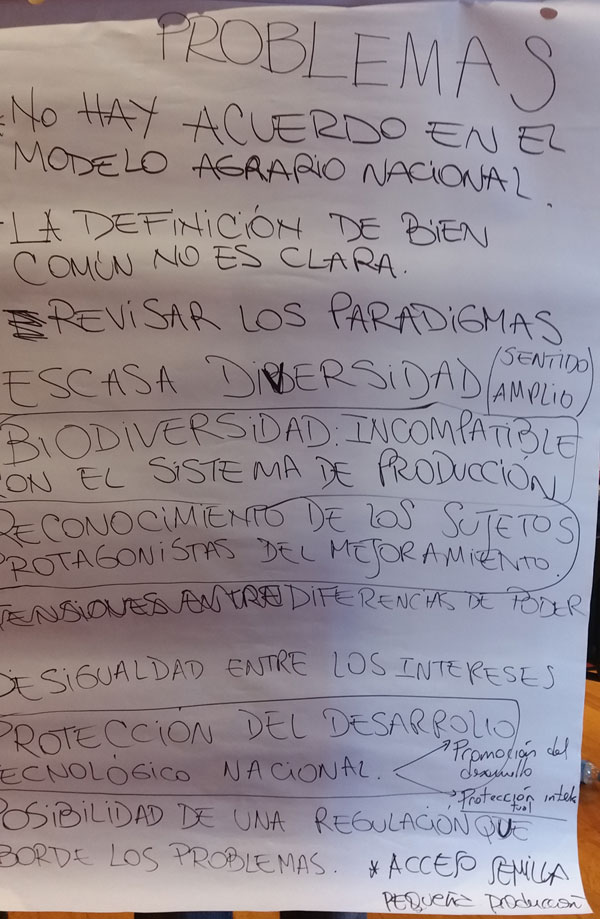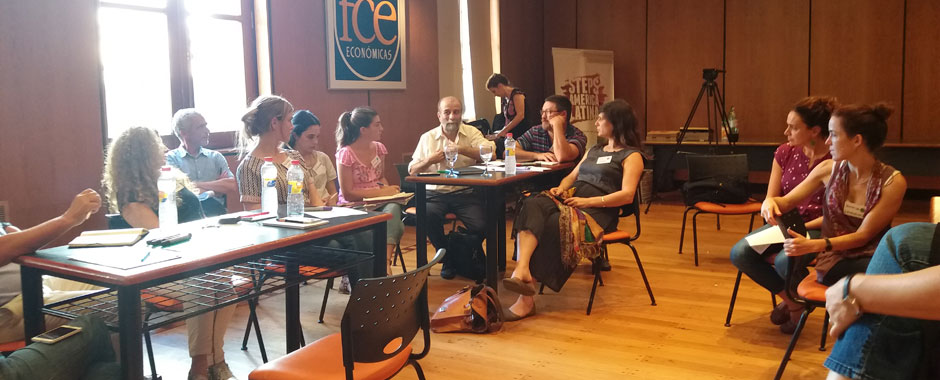Over the last three decades there has been an unprecedented process of concentration in world and regional seed markets. Seed R&D has shifted from being widely distributed over hundreds of medium and large seed firms and public sector institution to being heavily concentrated in just five or six multinational agro-chemical firms.
A range of consequences are likely to follow, all of which threaten to diminish different forms of diversity in agricultural systems. They include restrictions on the free circulation of germplasm, the loss of domestic seed breeding capabilities, concentration of R&D resources on fewer plant species and crop production constraints, diminishing agricultural biodiversity, and a less diverse range of agricultural production practices that the seed sector is able to support.
This set of issues is the focus for a ‘Transformation Lab’ (T-Lab) that STEPS América Latina is designing and running, as part of the STEPS consortium-wide ‘Pathways’ Network project, funded by the ISSC´s Transformations to Sustainability programme. We are experimenting with the idea of T-Labs in order to explore stakeholders’ views on the sustainability challenges associated with market concentration in the Argentinean seed sector, and to identify and co-design social innovations that can help foster more sustainable pathways of change in food and agricultural systems.
Understanding the seed sector
The task of designing such social innovations is complex, not least because the seed sector is understood and valued in distinctive ways by different actors, in terms of its boundaries, functions and outputs.
Is the sector, for instance, primarily a provider of technical services to commercial commodity crop producers – an activity that provides most of Argentina’s foreign exchange, in turn sustaining the entire national economy? Or does its value lie in enabling the development of important domestic technological capabilities? Or is it primarily a means of supporting a diverse rural social economy, one that can support the livelihoods of small farmers and protect key ecosystem services?
Given that there are many different ways of framing seed systems, the questions of what counts as a problem of sustainability, and why, and for who, and what kinds of solutions might be desirable and possible, are likely to differ markedly.
Why alliances are important
Our approach has been to include a wide range of actors in the research and events that comprise our T-Lab process. In part this is because we wanted to discover how different actors define and value sustainability problems and their possible solutions, but also because we want to identify potential alliances around specific problems and potential solutions, especially between actors that possess different resources (eg. expertise, organizational capacity, legitimation or finance). As Hubert Schmitz and Ian Scoones argue, alliance building is important because no single actor alone possess the resources to make transformations happen (pdf). Coalitions of actors, despite the inevitable compromise that might need to be made, are likely to have greater success linking novel, more sustainable practices with the skills, knowledge, sources of political support, finance and new markets that will be needed to nurture more sustainable and socially just pathways of change.
For instance, we are interested in whether there are some ‘sustainability problems’ concerning the seed sector that are shared more widely than others amongst different stakeholders (even if there is disagreement on the drivers of those problems), or whether diverse actors might support the same potential solutions, but for different reasons. It is not too difficult, for example, to imagine social innovations that both promise to support greater diversity in agricultural production with the development of domestic technological capabilities, thus ‘bridging’ across the priorities of different institutional actors.
Thinking differently
More intriguingly, are there particular sustainability solutions that might prompt actors to appreciate or reinterpret their interests and perspectives in slightly different ways?
An example of the latter, from a different field (energy), is the policy innovation of ‘Feed in Tariffs’. FITs permits households that generate renewable energy on their rooftops to sell any excess back to the grid. The innovation prompts households to reinterpret their own interests as aligned with that of the renewable energy sector, thus creating a larger political constituency behind that technological pathway. Might an intervention in the seed sector have the same ‘bridging’ effect?
Designing the T-Lab
In seeking to identify and support these kinds of alliances and bridging innovations we ran a T-Lab at the end of March with diverse representatives, ranging across members of Via Campesina, peri-urban agro-ecological producers, public and private sector seed breeders, government officials, specialists in intellectual property law, seed industry trade associations, and members of Congress’s agriculture commission.
A pilot Q-methodology exercise, performed prior to the meeting, helped us to map different discourses around seeds and sustainability, and to identify the more nuanced positions of actors that is apparent from public debate in this area, as well as areas of potential overlap between actors from different institutional backgrounds. We also organized the workshop so that people with different perspectives were encouraged to deliberate constructively and identify any common ground.

We collectively identified ten ‘sustainability problems’, ranging from the absence of clarity on what the ‘public good’ in the seed and agricultural sector consists of, to the lack of protection and support for domestic technological development, to the scarcity of agricultural diversity in all its senses. We explored possible solutions to a selection of these, ending up focusing on a problem that virtually all participants in the Q method exercise considered to be significant, namely that of the loss of biodiversity.
Solutions
The proposed solutions – with support from university-based plant breeders, scientists from the public sector research service, and rural NGOs and social movements present at the workshop – included the mapping of national and regional initiatives in participative breeding, and the creation of a network amongst actors working on and interested in that topic.
Through that network, the suggestion was that we could then experiment with a range of initiatives, such as: supporting capacity building in participative breeding; obtaining certification for the outputs of participative breeding; creating a market for the products of such seeds, when used in practices such as agro-ecological and fair trade production; and creating an open source licence that enforces continued free circulation of germplasm produced through participative breeding and that prevents its appropriation.
A second T-Lab event is planned for 2019, with more research and discussion leading up to it. As we go forward, success (or otherwise) in helping to initiate, test, and maintain these kinds of activities is likely to depend in large part on whether we can enroll a sufficiently diverse set of stakeholders to advocate for, and help nurture, such experiments.
Patrick van Zwanenberg is a researcher at Fundación CENIT in Buenos Aires, and a member of the ‘Pathways’ Network project team. He is also a member of STEPS América Latina, part of the Pathways to Sustainability Global Consortium.
For more resources from the Argentina case study, see the Intellectual Property and Seeds website set up by the STEPS América Latina team.
